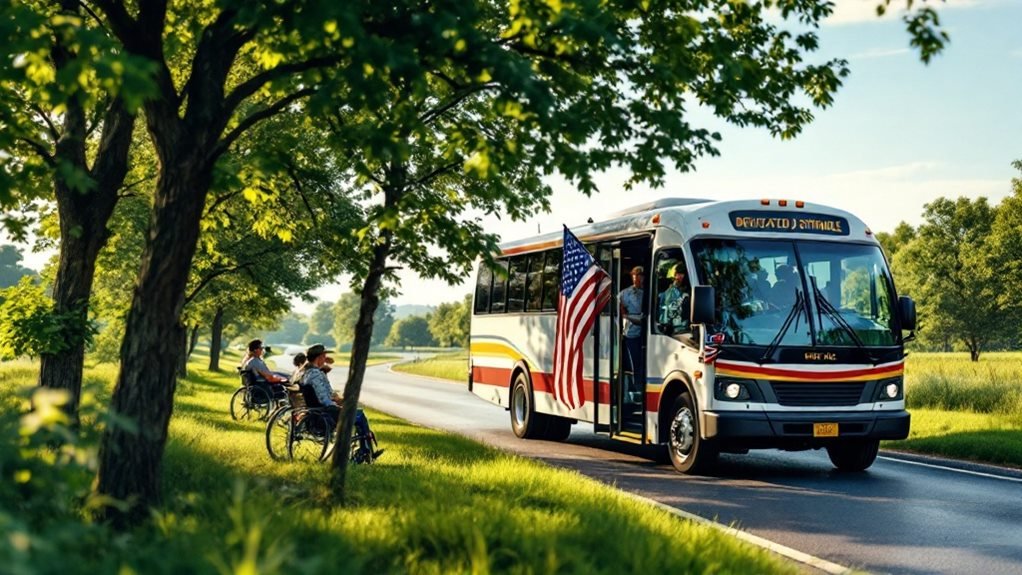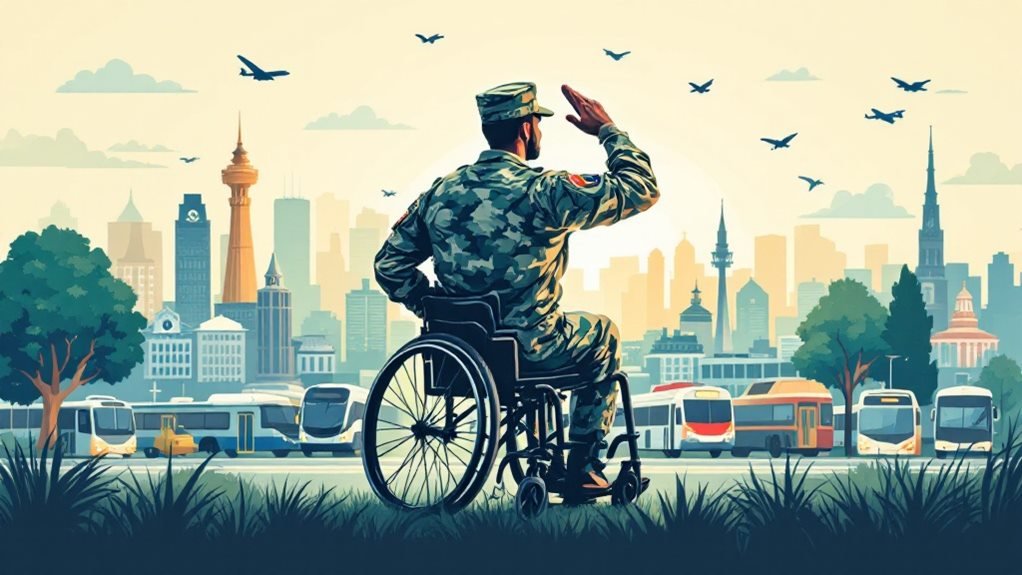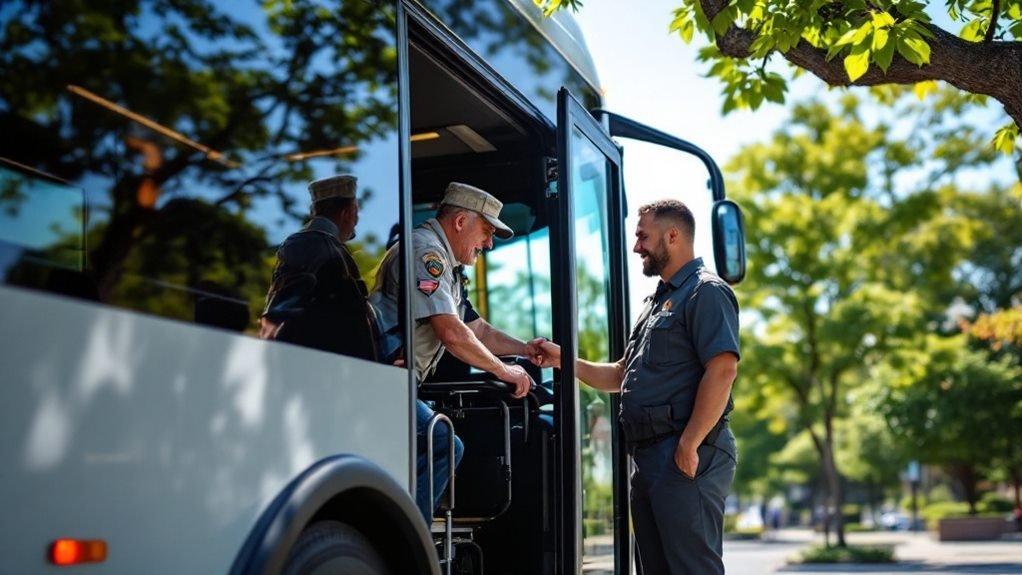Yes, the VA provides transportation for veterans who don't have personal vehicles. The Veterans Transportation Service (VTS) and the Veterans Transportation Program (VTP) are tailored to guarantee that veterans can reach medical, counseling, and rehabilitation appointments without stress. Assistance prioritizes veterans facing medical issues, disabilities, or financial hardships, and is usually available to those enrolled in the VA healthcare system. Scheduling rides through local VA medical centers and coordinating with community resources offers flexibility and accessibility, making sure no veteran's needs slip through the cracks. Keen to explore the details of these supportive services further?
Key Takeaways
- The VA offers transportation services for veterans without personal vehicles through programs like the Veterans Transportation Service (VTS).
- Veterans must typically be enrolled in the VA healthcare system to access transportation assistance.
- Priority for transportation is given to veterans with VA-authorized medical appointments and those facing financial or disability-related hardships.
- Veterans can schedule rides by contacting the VTS coordinator at their local VA medical center.
- Specialized transportation, including wheelchair-accessible options, is available for veterans with unique mobility challenges.
VA Transportation Services Overview
When it comes to guaranteeing our veterans have access to essential services, the VA Transportation Services play a critical role. As we explore this topic, we recognize that transportation challenges can greatly impact veteran mobility, especially for those without personal vehicles.
The Veterans Health Administration (VHA) acknowledges this and offers a range of options to help veterans reach their appointments, whether they're medical, counseling, or rehabilitation sessions.
Our focus is on how these services address the unique needs of veterans. The VA Transportation Services include the Veterans Transportation Service (VTS), which offers rides to VA medical facilities, and the Beneficiary Travel program, which reimburses eligible veterans for travel costs.
These programs aim to reduce barriers and enhance access to essential health services. Moreover, the VA collaborates with local communities and transportation providers to expand options and improve service efficiency.
We endeavor to guarantee that every veteran can access necessary care without the burden of transportation challenges. By addressing these obstacles, the VA Transportation Services aren't just about logistics; they're about dignity, independence, and honoring the commitment we've made to serve those who've served us.
Eligibility for Transportation Assistance
Understanding who qualifies for transportation assistance is key to guaranteeing veterans can effectively utilize these essential services. Together, we can navigate the complexities of eligibility to help veterans facing transportation challenges. Generally, veterans who need assistance due to medical reasons, disabilities, or financial hardships are prioritized for these services.
It's vital to recognize that each veteran's situation is unique, and the Department of Veterans Affairs assesses eligibility on a case-by-case basis. To qualify, veterans typically need to be enrolled in the VA healthcare system. Additionally, veterans who lack access to reliable transportation or face significant mobility issues may be eligible.
This can include those who live in rural areas, where public transportation options are limited, or those who've medical appointments that require specialized service. Our responsibility is to guarantee that veterans are aware of these opportunities and the specific criteria they must meet.
For those of us who value serving others, understanding these nuances allows us to better support veteran mobility and address their transportation challenges. By doing so, we guarantee they can access the care and resources they deserve, enhancing their quality of life and independence.
Veteran Transportation Service (VTS)
Let's explore how the Veteran Transportation Service (VTS) can be an essential resource for veterans without personal vehicles.
We need to understand the eligibility criteria and how to efficiently schedule rides to guarantee veterans can access important services.
Additionally, it's imperative to be aware of the specific areas VTS covers to plan transportation effectively.
Eligibility for VTS
Many veterans may wonder if they qualify for the Veteran Transportation Service (VTS), an essential resource designed to enhance access to healthcare for those without personal transportation.
Understanding eligibility is important, especially when transportation challenges and access barriers to necessary medical care can greatly impact our veterans' well-being. Let's explore who can benefit from this significant service.
Primarily, VTS is available to veterans enrolled in the VA healthcare system who face transportation issues. Those who live in rural areas, lack access to public transportation, or have physical limitations that prevent them from driving are typically eligible.
It's important for us to recognize that the VA prioritizes veterans with appointments for VA-authorized healthcare services, which underscores the program's mission to guarantee timely access to medical care.
Additionally, veterans with financial hardships or disabilities may find that VTS provides a lifeline to necessary treatments and consultations.
Our goal is to guarantee that every veteran has the opportunity to receive the healthcare they've earned, free from the worry of how they'll get there.
Scheduling VTS Rides
Scheduling rides through the Veteran Transportation Service (VTS) is a straightforward process that can greatly ease the burden of getting to essential medical appointments. As we navigate the intricacies of ride scheduling, it's vital to understand the steps and strategies that guarantee a smooth experience.
One of our primary ride scheduling tips is to contact the VTS coordinator at our local VA medical center well in advance. This proactive approach not only secures our spot but also allows for any necessary adjustments due to unforeseen circumstances.
Communication is key in transportation coordination strategies. We should clearly communicate our appointment details, including date, time, and location, to the VTS coordinator. This guarantees that our ride is tailored to our specific needs.
It's also helpful to confirm our ride a day before the appointment, providing an additional layer of certainty and peace of mind.
Moreover, if we've recurring appointments, let's discuss setting up a regular schedule with the coordinator. This strategy minimizes the need for repeated calls and helps maintain consistency in our transportation arrangements.
With these thoughtful and organized approaches, we can depend on VTS to support our healthcare journey efficiently.
VTS Service Areas
Understanding where the Veteran Transportation Service (VTS) operates is as important as scheduling our rides effectively.
We need to be aware of the service coverage to guarantee that our transportation needs are met promptly. VTS primarily operates in areas that have a significant population of veterans, focusing on providing transportation options to and from VA medical facilities.
It's vital for us to know if our area is covered and what the specific routes and schedules might be.
We can start by checking the local VA healthcare system's website or contacting our VA medical center's travel coordinator. They provide detailed information about the VTS service areas, assuring we've access to the essential medical appointments and services.
Transportation options might vary based on the region, with some areas offering more frequent services than others.
Veterans Transportation Program (VTP)
For veterans who find themselves without personal vehicles, the Veterans Transportation Program (VTP) offers a lifeline to access essential healthcare services.
We recognize the transportation challenges that our veterans face, especially when it comes to maintaining regular healthcare appointments. Veteran mobility is vital not only for accessing medical care but also for guaranteeing their overall well-being.
The VTP attempts to bridge this gap, providing a structured solution that addresses these challenges head-on. The program is designed with empathy and a clear mission: to guarantee no veteran is left without the means to receive the care they deserve.
We coordinate with local resources to facilitate transportation options tailored to veterans' needs, promoting accessibility and reliability. It's our goal to alleviate the stress that often accompanies arranging transportation, allowing veterans to focus on their health.
Special Mode Transportation Options
Veterans frequently require specialized transportation solutions that cater to their unique needs. Many of our veterans face mobility challenges due to service-related injuries or health conditions, making accessible transportation an essential service. The VA offers special mode transportation options designed specifically for these needs.
We recognize the importance of guaranteeing our veterans can attend medical appointments or participate in community activities without undue stress.
Specialized vehicles are equipped to accommodate veterans with disabilities, providing features such as wheelchair lifts, ramps, and secure seating arrangements. This guarantees safety and ease of access, allowing veterans to travel with dignity and independence.
These vehicles are driven by trained professionals who are sensitive to the unique requirements of veterans, guaranteeing a comfortable and respectful experience.
Our approach emphasizes empathy and attention to detail, recognizing the diverse needs of those who've served. By providing special mode transportation, we aim to reduce barriers and foster a sense of autonomy among veterans.
We believe that accessible transportation isn't just a service but a way to honor the sacrifices they've made. Let's continue to support our veterans by guaranteeing they've the transportation options they need to lead fulfilling lives.
Partnering With Community Resources
In addition to providing specialized transportation directly through VA services, we actively collaborate with community resources to enhance mobility options for veterans. Our community partnerships are essential in expanding the reach and efficiency of transportation services. By working closely with local initiatives, we guarantee that veterans can access reliable transport to medical appointments, social services, and other crucial destinations.
These partnerships often involve local transit authorities, veteran service organizations, and non-profit groups dedicated to veteran welfare. Together, we identify gaps in existing services and develop creative solutions to address them. For instance, by partnering with local transit, we can provide discounted or free fare programs specifically for veterans. This not only alleviates financial burdens but also fosters a sense of community support.
We recognize that each community has unique needs, and as a result, our approach is tailored to fit the specific circumstances of the veterans we serve. By leveraging local initiatives, we can adapt more quickly to changes and provide a more personalized service.
Our commitment is to facilitate seamless, dignified transportation, guaranteeing that no veteran feels isolated due to a lack of resources. Through collaboration, we endeavor to honor their service by supporting their mobility needs.
How to Request a Ride
Let's explore how we can request a ride to guarantee our veterans have access to essential services.
First, we should contact the VA for assistance, as they can guide us through the process and inform us about any eligibility requirements.
Once we've confirmed eligibility, scheduling a ride service becomes straightforward, guaranteeing our transportation needs are met efficiently.
Contacting VA for Assistance
For those of us seeking transportation assistance, reaching out to the Department of Veterans Affairs (VA) is a practical first step. The VA provides various transportation options and assistance resources to help guarantee that veterans can access the care and services they need.
Understanding how to tap into these resources is essential for making our journeys as smooth as possible.
When we contact the VA for assistance, it's important to have our personal information ready, such as our VA identification number and details about our healthcare appointments. We can start by calling our local VA medical center's office, where a representative can guide us through the available transportation options.
It's helpful to ask specific questions about eligibility and coverage, making sure we gather all the necessary details.
Furthermore, we can explore the VA's website, which offers extensive information about transportation programs and assistance resources, including guidance on how to connect with service providers.
Scheduling a Ride Service
Scheduling a ride service can feel overwhelming, but with the right guidance, we can navigate it smoothly. Understanding the available transportation options is vital for veterans who don't own cars. Our first step is to contact the Veterans Affairs (VA) transportation office or the Veteran Transportation Service (VTS) directly. This guarantees we're getting accurate, up-to-date information tailored to our specific needs.
Once we've reached out, we should inquire about the ride scheduling process. They may offer a variety of transportation options, such as vans, shuttles, or contracted services. It's important to ask about the lead time required for scheduling a ride, as some services might need advance notice.
We should also be prepared to provide details about our appointment, including date, time, and location, to facilitate efficient scheduling.
If we encounter any difficulties during the ride scheduling process, let's not hesitate to seek assistance. VA staff are there to help us, making certain we can access the care and services we deserve.
Eligibility Requirements Overview
Understanding the eligibility requirements is vital when requesting a ride through the Veterans Affairs transportation services. Our goal is to guarantee veterans have smooth access to transportation options that fit their needs.
First, we must determine if we meet the eligibility criteria, which include being enrolled in the VA healthcare system and having a scheduled VA medical appointment. It's imperative that we confirm these details with our local VA facility, as criteria might vary slightly depending on the region.
Once eligibility is verified, the next step is to request a ride. We should contact the Veterans Transportation Service (VTS) or Beneficiary Travel office at our local VA facility. It's a good idea to do this well in advance of our appointment, as transportation slots can fill up quickly.
We need to provide our appointment details and confirm any specific assistance required, like wheelchair access.
Being proactive in this process guarantees that the transportation options available are utilized efficiently, allowing us to focus on the well-being of the veterans we serve.
Additional Support for Veterans
In recent years, we've seen a growing recognition of the need for extensive support systems for veterans, especially those facing transportation challenges. Beyond just providing rides, it's essential that we address broader issues affecting these individuals.
Mental health services are critical, as many veterans face significant emotional and psychological hurdles after their service. Accessible transportation can facilitate regular visits to mental health professionals, guaranteeing veterans receive consistent care and support.
Moreover, job placement programs are essential in helping veterans reintegrate into civilian life. Transportation barriers can severely limit employment opportunities, making it difficult for veterans to attend interviews or maintain steady jobs. By offering thorough transportation solutions, we enable them to explore job placements that match their skills and aspirations, ultimately fostering long-term stability.
Let's remember that transportation is just one piece of the puzzle. As a community dedicated to serving others, we must also advocate for extensive policies that support veterans in all facets of their lives.
This includes housing assistance, educational opportunities, and financial counseling, all of which are fundamental to their well-being. Together, we can guarantee that veterans receive the holistic support they deserve and have earned.
Conclusion
In life's journey, we all need a helping hand, especially when the road feels long and winding. The VA's transportation services are here to guarantee none of us travel alone. From VTS to community partnerships, options abound for those without a vehicle. Let's lean on these resources and embrace the support available. Together, we can guarantee every veteran reaches their destination safely and comfortably, embodying the spirit of camaraderie and care that binds us.



